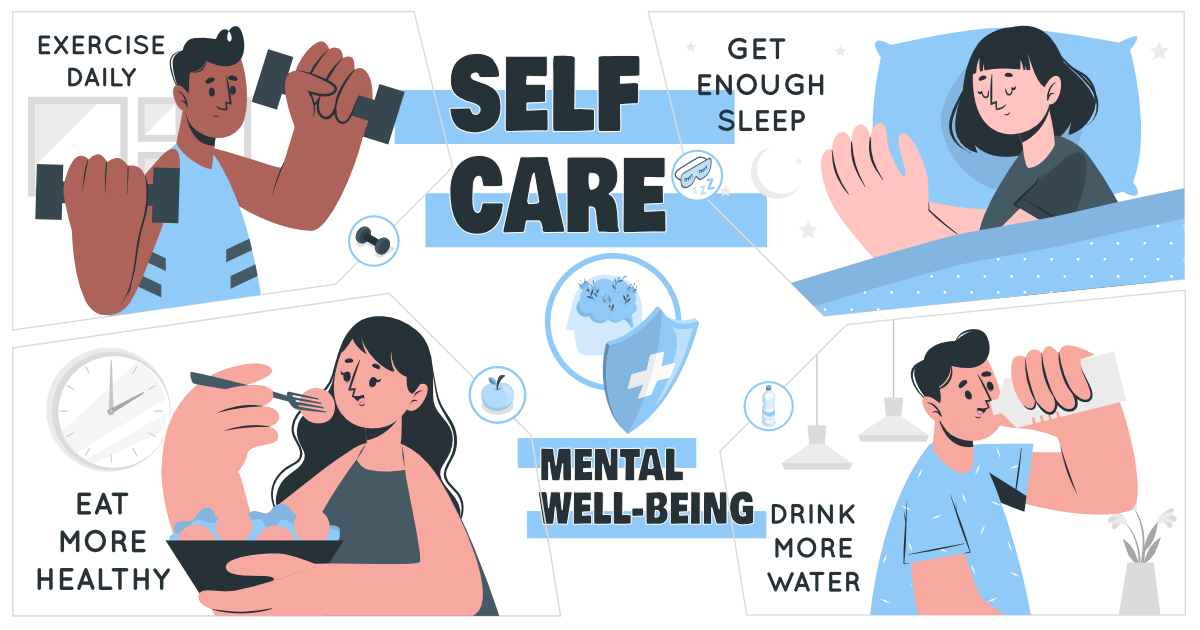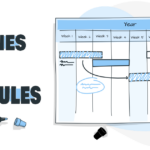As an entrepreneur, it’s easy to become consumed by the demands of your work and neglect your personal health and well-being. However, taking care of yourself is not only crucial for your happiness and satisfaction, but it also has a direct impact on your professional success. Self-care and mental well-being are essential components of a healthy and productive life, and it’s important for entrepreneurs to prioritize them. In this sub-topic, we will delve into the importance of self-care and mental well-being for entrepreneurs and provide tips and strategies for maintaining a healthy balance.
Understanding the impact of stress and burnout on entrepreneurs and how to manage it
As an entrepreneur, you are likely to be highly driven and committed to your business and its success. However, it’s also important to recognize the impact of stress and burnout, and to take steps to manage them. This article will explore the effects of stress and burnout on entrepreneurs, and provide actionable tips and best practices for managing them.
Understanding the impact of stress and burnout
Stress and burnout are common experiences for entrepreneurs, who often work long hours and carry a heavy workload. Chronic stress can lead to physical and emotional exhaustion, reducing your ability to focus and perform effectively. In the worst-case scenario, it can lead to burnout, which is a complete physical and emotional breakdown.
Managing stress and burnout
To avoid stress and burnout, it’s crucial to prioritize self-care and mental well-being. Here are some tips for managing stress and burnout:
- Establish a daily routine: Creating a daily routine can help you prioritize self-care and ensure that you’re taking time for yourself every day.
- Exercise regularly: Exercise has been shown to reduce stress and improve mental well-being. Consider adding physical activity to your daily routine.
- Connect with others: Having a support system of friends and family is crucial for managing stress and burnout. Make time for social activities, and consider seeking the help of a therapist or counselor if needed.
- Set boundaries: Make sure to set boundaries between work and personal life to prevent work from becoming all-consuming.
- Practice mindfulness and meditation: Mindfulness and meditation can help reduce stress and improve mental well-being. Consider incorporating these practices into your daily routine.
Best Practices and Tools
- Time management: Effective time management is key to avoiding stress and burnout. Make sure to prioritize the most important tasks and delegate the rest.
- Prioritize sleep: Getting enough sleep is crucial for managing stress and burnout. Aim for 7-9 hours of sleep per night.
- Stay organized: Keeping your work and personal life organized can help reduce stress and improve efficiency. Consider using tools such as calendars, to-do lists, and task management software to stay on top of your schedule.
- Manage your workload: Make sure to manage your workload effectively by prioritizing tasks and delegating when necessary.
- Practice self-care: Make sure to prioritize self-care and take time for yourself regularly. Consider incorporating activities such as meditation, exercise, and hobbies into your routine.
Conclusion
Stress and burnout are common experiences for entrepreneurs, but it’s possible to manage them. By prioritizing self-care and mental well-being, setting boundaries, and using tools and best practices to manage stress, you can ensure that your work and personal life are in balance.
Strategies for maintaining good physical and mental health as an entrepreneur
Being an entrepreneur is one of the most challenging and rewarding careers one can choose. Entrepreneurship can provide unlimited growth and earning potential, but it also comes with a high level of stress and burnout. It’s crucial for entrepreneurs to maintain good physical and mental health to ensure long-term success and happiness in both their personal and professional lives.
Step-by-Step Guide for Good Physical Health
- Get enough sleep: It’s essential to get adequate sleep to function optimally and maintain physical and mental health. The recommended amount of sleep is 7-9 hours per night.
- Exercise regularly: Regular physical activity can help reduce stress, improve mental clarity, and boost overall health. Find an exercise routine that works for you, and stick to it.
- Eat a healthy diet: Eating a balanced diet rich in fruits, vegetables, whole grains, and lean protein can improve physical and mental health, boost energy levels, and reduce the risk of chronic disease.
- Avoid substance abuse: Substance abuse, such as alcohol, drugs, and tobacco, can have harmful effects on both physical and mental health. It’s essential to avoid them or seek help if necessary.
Step-by-Step Guide for Good Mental Health
- Manage stress: Stress is an inevitable part of entrepreneurship, and it’s essential to find healthy ways to manage it. Consider activities like yoga, meditation, or journaling to help reduce stress and improve mental well-being.
- Cultivate positive relationships: Surrounding yourself with positive, supportive people can help improve mental well-being and provide a sense of community.
- Find meaning and purpose: Entrepreneurship can be stressful, and it’s essential to have a clear sense of purpose and meaning to keep motivation and energy levels high. Find ways to connect with your passion and purpose, whether it’s through your work or other interests.
- Seek help if necessary: If stress, anxiety, or depression become overwhelming, seek professional help from a therapist or counselor.
Best Practices and Tools
- Schedule self-care activities: Incorporate self-care activities, such as exercise, meditation, and leisure time, into your schedule. Use a planner or calendar to ensure that you make time for self-care regularly.
- Take breaks regularly: Regular breaks throughout the day can help reduce stress and improve mental well-being. Consider scheduling short breaks throughout the day to recharge and refocus.
- Use technology to support self-care: There are many apps and tools available that can help entrepreneurs prioritize their physical and mental health. Consider using apps like Headspace, MyFitnessPal, or Calm to support your self-care journey.
Examples and Real-Life Scenarios
- John, a busy entrepreneur, schedules a daily yoga class before work to help manage stress and maintain physical health.
- Sarah, a tech entrepreneur, sets aside 30 minutes each day for meditation to help improve mental clarity and reduce stress levels.
- Tom, a busy consultant, uses an app like MyFitnessPal to track his diet and exercise habits, helping him maintain good physical health.
Actionable Tips
- Incorporate Exercise into Your Daily Routine: Regular physical activity is essential for both your physical and mental health. Try to set aside at least 30 minutes a day for exercise, whether it be a walk, yoga, or a more intense workout.
- Eat a Healthy Diet: Eating a well-balanced diet full of whole foods can help you feel your best, both physically and mentally. Focus on eating a variety of fruits, vegetables, whole grains, and lean protein.
- Get Enough Sleep: Aim for 7-8 hours of quality sleep each night. Sleep is essential for your physical and mental health, and it is important to make it a priority.
- Practice Mindfulness: Take a few minutes each day to practice mindfulness or meditation. This can help you manage stress and maintain a positive outlook on life.
- Take Breaks When You Need Them: Taking breaks throughout the day can help you recharge and stay focused. Whether it be a quick walk, a coffee break, or a nap, taking time for yourself can help you maintain your well-being.
- Seek Professional Help When Needed: Don’t hesitate to seek professional help if you are struggling with your mental health. Talking to a therapist or counselor can be a valuable resource for managing stress and maintaining your well-being.
Conclusion
Maintaining good physical and mental health is crucial for entrepreneurs, as they often face high levels of stress and burnout. Incorporating exercise, eating a healthy diet, getting enough sleep, practicing mindfulness, taking breaks, and seeking professional help when needed are just some of the strategies that can help entrepreneurs maintain their well-being and succeed in their business ventures. By prioritizing their health, entrepreneurs can be better equipped to tackle the challenges that come with running a business.
Tips for managing stress and anxiety
Stress and anxiety can be a major hindrance to success as an entrepreneur. In order to maintain good mental and physical health, it is crucial to learn how to manage stress and anxiety in a healthy and effective way. This article will provide a step-by-step guide on how to manage stress and anxiety as an entrepreneur.
Step 1: Recognize the Signs of Stress and Anxiety
The first step in managing stress and anxiety is to recognize the signs. This can include physical symptoms such as headaches, muscle tension, and fatigue, as well as emotional symptoms such as irritability, restlessness, and feelings of hopelessness. By recognizing the signs of stress and anxiety, you can take steps to address the underlying causes and find effective ways to manage them.
Step 2: Identify the Causes of Stress and Anxiety
Once you have recognized the signs of stress and anxiety, it is important to identify the causes. This can involve taking a close look at your work and personal life to identify the sources of stress and anxiety. Common causes of stress and anxiety for entrepreneurs include high workload, lack of control over the direction of the business, and uncertainty about the future.
Step 3: Develop a Stress Management Plan
After identifying the causes of stress and anxiety, the next step is to develop a stress management plan. This plan should include strategies for reducing stress and anxiety, as well as activities and practices that promote relaxation and mental well-being. Common stress management strategies include exercise, mindfulness and meditation, and time management techniques.
Step 4: Incorporate Self-Care into Your Daily Routine
Self-care is an essential aspect of managing stress and anxiety as an entrepreneur. Incorporating self-care activities into your daily routine, such as taking regular breaks, eating a healthy diet, and getting enough sleep, can help you to feel more relaxed and refreshed, reducing the effects of stress and anxiety.
Step 5: Seek Professional Help If Needed
If stress and anxiety become too overwhelming to manage on your own, it is important to seek professional help. This may involve seeing a mental health professional, such as a therapist or counselor, who can help you to identify the underlying causes of your stress and anxiety and develop an effective treatment plan.
Actionable Tips
- Set realistic goals and priorities
- Practice self-care regularly
- Exercise regularly
- Get enough sleep and maintain a healthy diet
- Practice mindfulness and meditation
- Seek professional help if needed
Conclusion
Balancing work and personal life as an entrepreneur can be challenging, but with the right strategies and support, it is possible to manage stress and anxiety and maintain good mental and physical health. By recognizing the signs of stress and anxiety, identifying the causes, developing a stress management plan, incorporating self-care into your daily routine, and seeking professional help if needed, you can take control of your well-being and achieve success as an entrepreneur.
The importance of regular exercise and healthy eating for entrepreneurs
As an entrepreneur, it can be challenging to maintain a healthy lifestyle and balance work and personal life. The fast pace of running a business, along with long hours, high levels of stress, and a lack of structure can lead to unhealthy habits and neglect of physical and mental well-being. However, incorporating regular exercise and healthy eating into your routine can have numerous benefits for both your personal and professional life.
Physical activity and a nutritious diet play a vital role in reducing stress, improving mood, increasing energy levels, and boosting cognitive function. Regular exercise and healthy eating also help maintain a healthy weight, reduce the risk of chronic illnesses, and improve overall quality of life. For entrepreneurs, incorporating these habits into their routine can lead to increased productivity, better decision-making, and improved resilience to handle stress.
Step-by-Step Guide
- Assess your current habits: Take note of your current exercise routine and eating habits. Are you getting enough physical activity? Are you eating a balanced diet?
- Set realistic goals: Set achievable goals for incorporating exercise and healthy eating into your routine. Aim for 30 minutes of moderate exercise, such as brisk walking, every day.
- Make a plan: Plan your exercise and meals for the week ahead. Make sure to include a variety of foods and physical activities that you enjoy.
- Stick to a routine: Make exercise and healthy eating a part of your daily routine. Try to exercise at the same time every day, and pack healthy snacks and meals for work.
- Get support: Surround yourself with people who support and encourage a healthy lifestyle. Find a workout buddy or join a fitness class.
Actionable Tips
- Incorporate physical activity into your workday: Take regular breaks from your desk and go for a walk. Stand up and stretch during conference calls.
- Make healthy eating convenient: Prepare healthy meals and snacks in advance, and keep them readily available for when you’re on the go.
- Get adequate sleep: Aim for 7-8 hours of sleep each night. Poor sleep can negatively impact physical and mental well-being.
- Find an enjoyable form of exercise: Find a physical activity that you enjoy and look forward to, whether it’s yoga, running, or playing a sport.
- Treat yourself: Reward yourself for reaching your exercise and healthy eating goals. This can be as simple as treating yourself to a healthy meal or a relaxing activity.
Conclusion
Incorporating regular exercise and healthy eating into your routine as an entrepreneur can have numerous benefits for both personal and professional life. By making small changes, setting achievable goals, and sticking to a routine, you can improve your physical and mental well-being, boost productivity, and reduce stress.
How to develop a self-care routine and stick to it
Self-care is a critical component of an entrepreneur’s life that helps to maintain good physical, emotional, and mental well-being. Taking care of oneself can have a significant impact on overall productivity and success. However, establishing a routine that incorporates self-care activities can be challenging, especially for entrepreneurs who are always busy. In this article, we will discuss the importance of a self-care routine and provide a step-by-step guide on how to develop and stick to it.
Step-by-Step Guide
- Identify Your Needs: The first step in developing a self-care routine is to identify what you need to care for yourself. This may include physical activities like exercise, emotional support, mental stimulation, or spiritual practices.
- Assess Your Schedule: Once you have a list of self-care activities, it’s time to assess your schedule to see what you can realistically incorporate into your routine. This may involve rearranging your work schedule or delegating tasks to free up time for self-care.
- Make a Plan: Create a plan that incorporates self-care activities into your routine. This could be as simple as setting aside time for exercise or meditation in the morning or scheduling a weekly massage or spa appointment.
- Set Realistic Goals: When setting self-care goals, it’s important to be realistic about what you can achieve. Don’t set goals that are too difficult to reach or are impossible to stick to in the long-term.
- Incorporate Variety: To keep your self-care routine interesting and engaging, it’s essential to incorporate a variety of activities. This could include physical activities, mental stimulation, emotional support, and spiritual practices.
- Stick to Your Routine: The most critical step in establishing a self-care routine is to stick to it. This may require discipline and a commitment to prioritize self-care, but it will be worth it in the long run.
Best Practices
- Practice mindfulness and self-reflection to stay present and in touch with your needs
- Prioritize self-care and make it a non-negotiable part of your routine
- Stay accountable by sharing your self-care goals and progress with a friend or mentor
- Experiment with different self-care activities to find what works best for you
Actionable Tips
- Keep a self-care journal to track your progress and identify areas for improvement
- Set reminders and alerts on your phone to keep yourself on track
- Reward yourself for reaching self-care goals and celebrate your progress
- Surround yourself with supportive friends and family who encourage and support your self-care efforts
Conclusion
Developing and sticking to a self-care routine is crucial for entrepreneurs who want to maintain good physical, emotional, and mental well-being. By identifying your needs, assessing your schedule, making a plan, and setting realistic goals, you can establish a self-care routine that works for you. Incorporating a variety of activities and prioritizing self-care can help you achieve long-term success in both your personal and professional life.
The power of mindfulness and meditation in maintaining mental well-being
Mindfulness and meditation have become increasingly popular in recent years as a means of reducing stress and promoting mental well-being. As entrepreneurs, it’s essential to maintain good mental health, as it can impact not only our personal lives but also the success of our businesses. In this article, we’ll explore the power of mindfulness and meditation and how entrepreneurs can incorporate them into their daily routine.
The Importance of Mindfulness and Meditation
Stress and anxiety are common issues for entrepreneurs, and it’s important to find ways to manage them effectively. Research has shown that mindfulness and meditation can help reduce stress and anxiety, increase focus, and improve overall well-being. Practicing mindfulness involves being fully present in the moment and paying attention to our thoughts and emotions without judgment. Meditation, on the other hand, is a form of mindfulness that involves focused breathing and visualization techniques to calm the mind and body.
Step-by-Step Guide to Mindfulness and Meditation
- Choose a quiet, distraction-free environment
When practicing mindfulness and meditation, it’s important to find a quiet, distraction-free environment where you can focus on your breathing and thoughts without interruption. You can choose to sit or lie down, whichever is more comfortable for you.
- Start with deep breathing exercises
Take a few deep breaths to help calm your mind and body. Breathing exercises are an essential part of mindfulness and meditation and help to reduce stress and improve mental clarity.
- Focus on the present moment
When practicing mindfulness, it’s important to focus on the present moment and not allow your mind to wander. Pay attention to your thoughts and emotions and try not to judge them. Simply observe them and let them pass.
- Incorporate visualization techniques
Meditation involves visualization techniques that help to calm the mind and body. You can visualize a peaceful place or imagine yourself in a happy state. This can help to reduce stress and anxiety and promote a sense of peace and relaxation.
- Set a routine
Mindfulness and meditation are most effective when practiced regularly. Set aside a specific time each day to practice and try to stick to it. You may also find it helpful to use guided meditation apps or attend mindfulness classes.
Actionable Tips
- Start with just a few minutes a day and gradually increase the time
- Find a mindfulness or meditation technique that works for you
- Incorporate mindfulness into your daily routine by taking a mindful walk or paying attention to your breathing during yoga
- Make mindfulness and meditation a part of your daily routine, such as meditating first thing in the morning or just before bed
- Use guided meditation apps or attend mindfulness classes to help stay motivated and on track.
Conclusion
Mindfulness and meditation can play a crucial role in maintaining good mental health and reducing stress and anxiety. By incorporating these techniques into your daily routine, entrepreneurs can improve focus, clarity, and overall well-being. Regular practice is key to experiencing the benefits of mindfulness and meditation, so be sure to set aside time each day to practice and stick to it.
The importance of good sleep hygiene and managing insomnia
Good sleep hygiene and the management of insomnia are crucial for maintaining overall mental and physical well-being. Entrepreneurs are often subject to high levels of stress and long work hours, making it challenging to prioritize and get enough quality sleep. In this article, we’ll explore why good sleep hygiene is vital, and provide tips and strategies for managing insomnia.
The Impact of Insufficient Sleep
Lack of sleep can have a significant impact on physical and mental health. Poor sleep can lead to decreased energy levels, increased stress, and decreased productivity, which can be detrimental to an entrepreneur’s success. On the other hand, a good night’s sleep helps restore energy, reduces stress, and improves overall well-being.
Step-by-Step Guide to Good Sleep Hygiene
- Establish a consistent sleep schedule: Try to go to bed and wake up at the same time every day, even on weekends.
- Create a relaxing bedtime routine: This could be reading a book, listening to calming music, or taking a warm bath.
- Limit exposure to screens before bedtime: The blue light emitted by screens can interfere with the production of melatonin, making it difficult to fall asleep.
- Create a comfortable sleep environment: Ensure that your bed is comfortable and your room is cool, dark, and quiet.
- Avoid caffeine, nicotine, and alcohol before bedtime: These substances can interfere with sleep and make it harder to fall asleep and stay asleep.
- Exercise regularly: Regular physical activity can improve sleep quality, reduce stress levels, and promote relaxation.
- Limit napping during the day: Napping during the day can disrupt the body’s natural sleep-wake cycle and make it harder to fall asleep at night.
Strategies for Managing Insomnia
- Cognitive behavioral therapy for insomnia (CBT-I): CBT-I is a therapeutic approach that helps change negative thoughts and behaviors related to sleep.
- Sleep restriction therapy: This therapy involves limiting the amount of time spent in bed to increase sleep efficiency and reduce the time spent lying awake at night.
- Relaxation techniques: Relaxation techniques such as deep breathing, progressive muscle relaxation, and guided imagery can help calm the mind and promote sleep.
- Medication: In some cases, medication may be prescribed to manage symptoms of insomnia. However, it’s important to discuss the potential risks and benefits of medication with a healthcare professional.
Actionable Tips
- Keep a sleep diary: This can help you identify patterns and triggers that may be contributing to insomnia.
- Practice good sleep hygiene: Incorporating the steps outlined above into your daily routine can help improve sleep quality.
- Get regular exercise: Regular physical activity can improve sleep quality and reduce stress levels.
- Avoid caffeine, nicotine, and alcohol before bedtime: These substances can interfere with sleep and make it harder to fall asleep and stay asleep.
- Limit exposure to screens before bedtime: The blue light emitted by screens can interfere with the production of melatonin, making it difficult to fall asleep.
- Seek support from a healthcare professional: If you’re having trouble managing insomnia, consider seeking support from a healthcare professional.
Conclusion
Good sleep hygiene and the management of insomnia are crucial for maintaining overall mental and physical well-being. By incorporating the steps outlined in this article into your daily routine, and seeking support when needed, entrepreneurs can improve their sleep quality, reduce stress levels, and improve their overall well-being.
How to create a positive and supportive work environment
As an entrepreneur, creating a positive and supportive work environment can play a significant role in maintaining good mental health, reducing stress and promoting overall well-being. A supportive work environment is one where employees feel valued, respected, and encouraged to achieve their goals. This can help to boost morale and productivity, as well as promote a positive and healthy work-life balance.
Step 1: Foster open communication
Encouraging open and transparent communication is key to creating a positive work environment. This means that employees should feel comfortable sharing their thoughts and ideas, without fear of negative consequences. To achieve this, it is important to establish regular team meetings, where everyone can provide feedback and discuss any concerns they may have. This can help to build trust and encourage collaboration, which can in turn create a more supportive work environment.
Step 2: Promote work-life balance
Work-life balance is a critical component of a positive and supportive work environment. Encouraging employees to take time off when they need it, and supporting flexible working arrangements, can help to reduce stress and promote overall well-being. This can include offering flexible working hours, remote working options, and regular breaks throughout the day.
Step 3: Recognize and reward success
Recognizing and rewarding success is a great way to boost morale and show employees that their contributions are valued. This can include verbal recognition, bonuses, promotions, or other forms of incentives. Providing regular feedback and setting achievable goals can also help to keep employees motivated and engaged.
Step 4: Provide training and development opportunities
Providing opportunities for training and development can help employees to achieve their full potential and feel fulfilled in their roles. This can include professional development courses, workshops, and mentorship programs. Allowing employees to take on new challenges and learn new skills can help to keep them engaged and motivated, and can also benefit the business by developing a highly skilled workforce.
Step 5: Create a positive physical work environment
A positive physical work environment can also contribute to overall well-being and job satisfaction. This can include providing ergonomic equipment, a comfortable and clean workspace, and promoting good hygiene practices. Creating an environment that is visually appealing and pleasant to be in can also help to boost morale and promote positive mental health.
Actionable Tips
- Encourage regular team meetings where employees can share their thoughts and ideas.
- Support flexible working arrangements and promote work-life balance.
- Provide regular feedback and set achievable goals.
- Offer training and development opportunities to employees.
- Ensure a comfortable and visually appealing physical work environment.
Conclusion
Creating a positive and supportive work environment is critical for the well-being of entrepreneurs and their employees. By fostering open communication, promoting work-life balance, recognizing and rewarding success, providing training and development opportunities, and creating a positive physical work environment, entrepreneurs can help to reduce stress and promote good mental health, as well as boost productivity and morale.
The role of therapy and counseling in maintaining mental well-being
As entrepreneurs, stress and burnout are common challenges that can take a toll on mental well-being. While self-care and mindfulness practices can help alleviate these symptoms, sometimes they may not be enough. In such situations, seeking professional help from a therapist or counselor can be a viable solution.
Step-by-Step Guide:
- Identifying the need for therapy: The first step in seeking therapy is recognizing the need for it. If you are experiencing symptoms such as prolonged stress, anxiety, depression, or burnout, it may be time to seek professional help.
- Finding a qualified therapist: Once you have decided to seek therapy, it is essential to find a qualified therapist. Look for a therapist who specializes in dealing with stress and burnout, has relevant experience and credentials, and has a positive reputation.
- Making an appointment: Once you have found a suitable therapist, make an appointment and start the process. Many therapists offer initial consultations, which can be a great opportunity to assess the fit and decide if you are comfortable working with them.
- The therapy process: The therapy process usually involves several sessions, during which you will discuss your thoughts, feelings, and experiences. The therapist will work with you to identify the root causes of your stress and anxiety, and help you develop coping strategies.
- Incorporating therapy into your self-care routine: Regular therapy sessions should be integrated into your self-care routine, just like any other self-care activity. Consider therapy as an investment in your mental well-being and prioritize it accordingly.
Best Practices
- Be honest and open during therapy sessions
- Set achievable goals and work towards them with the help of your therapist
- Incorporate coping strategies learned in therapy into your daily life
- Regularly communicate with your therapist to track progress and make adjustments as needed
Tools
- TalkSpace: A virtual therapy platform that connects you with licensed therapists for online counseling sessions
- BetterHelp: An online therapy platform that connects you with licensed therapists for video and text-based counseling
- Headspace: A mindfulness and meditation app that offers guided meditations and stress-management tools
Actionable Tips
- Set aside a specific time each week for therapy sessions
- Create a supportive network of family and friends to help you through the therapy process
- Practice self-care activities regularly, such as exercise, healthy eating, and mindfulness
Examples
- A startup founder who experiences stress and burnout due to the demands of running a company may seek therapy to manage these symptoms and maintain their mental well-being.
- An entrepreneur who struggles with anxiety may turn to therapy to develop coping strategies and improve their overall mental health.
Conclusion
Therapy and counseling can play a crucial role in maintaining mental well-being for entrepreneurs. By seeking professional help, entrepreneurs can address the root causes of their stress and anxiety, develop coping strategies, and prioritize their mental health. Regular therapy sessions, combined with self-care activities, can help entrepreneurs maintain a healthy work-life balance and achieve their goals.
How to build a support system to help you maintain good mental health
Entrepreneurship can be a lonely journey, with many challenges and obstacles to overcome. It’s important to have a support system in place to help you stay mentally and emotionally healthy. This support system can consist of family members, friends, peers, mentors, and even professional therapists. In this article, we’ll explore the importance of building a support system and how to go about creating one.
Why is a Support System Important?
A support system provides a safety net when you’re feeling overwhelmed, stressed, or anxious. When things are going well, a support system can provide a sounding board for new ideas and help you stay motivated. When things are going wrong, a support system can provide comfort, encouragement, and advice. Having people in your life who care about you and your success can be a powerful motivator and can help you maintain good mental health.
How to Build a Support System
- Identify your support needs: Determine what kind of support you need, whether it be emotional, practical, or financial. This will help you know who to reach out to for help.
- Reach out to family and friends: Your close family members and friends are often the first people you can turn to for support. They are likely to be understanding and willing to help in any way they can.
- Connect with peers: Joining a networking group, taking a course, or attending events in your industry can provide you with opportunities to connect with peers who understand the challenges of entrepreneurship.
- Find a mentor: A mentor can provide valuable advice, guidance, and support as you navigate the ups and downs of entrepreneurship.
- Consider therapy or counseling: If you’re struggling with stress, anxiety, or other mental health issues, therapy or counseling can be a valuable part of your support system.
Tips for Building a Support System
- Be open and honest about your needs: Letting others know what you need from them can help ensure that you receive the support you’re looking for.
- Be proactive in seeking out support: Don’t wait for others to offer help. Take the initiative to reach out to those who can help.
- Be a good listener: Support goes both ways. Be there for others and be a good listener when they need it.
- Make time for self-care: Taking care of yourself is an important part of maintaining good mental health and being there for others.
- Practice gratitude: Acknowledge and appreciate the support you receive. Expressing gratitude can strengthen relationships and make you feel good.
Conclusion
Building a support system is an important aspect of maintaining good mental health as an entrepreneur. With the right support in place, you can navigate the challenges of entrepreneurship with greater confidence and resilience. By being open and proactive, connecting with peers and mentors, and considering therapy or counseling, you can build a support system that works for you.
Resources and References
- “The Lean Entrepreneur: How to Accomplish More by Doing Less” by Brant Cooper and Patrick Vlaskovits
- “The 7 Habits of Highly Effective People” by Stephen Covey
- “Mindfulness: An Eight-Week Plan for Finding Peace in a Frantic World” by Mark Williams and Danny Penman
- “The Power of Now: A Guide to Spiritual Enlightenment” by Eckhart Tolle
- “The Miracle Morning: The Not-So-Obvious Secret Guaranteed to Transform Your Life (Before 8AM)” by Hal Elrod.
- “The Mind Gym: An Athlete’s Guide to Inner Excellence” by Gary Mack and David Casstevens
- “Man’s Search for Meaning” by Viktor E. Frankl
- “The Little Book of Mindfulness: 10 minutes a day to less stress, more peace” by Dr. Patrizia Collard
- “The Upside of Stress: Why Stress Is Good for You, and How to Get Good at It” by Kelly McGonigal
- “The 4-Hour Body: An Uncommon Guide to Rapid Fat-Loss, Incredible Sex, and Becoming Superhuman” by Timothy Ferriss
- “The Self-Care Solution: A Modern Guide to holistic Healing for Busy Women” by Latham Thomas
- “The Art of Self-Care: Creative Ways to Nourish Your Body, Mind, and Soul” by Robyn L. Mello
- “The Power of Self-Care: A Practical Guide to Building Resilience, Reducing Stress, and Thriving in Life and Work”
- “The Miracle of Mindfulness: An Introduction to the Practice of Meditation” by Thich Nhat Hanh.
- “The Power of Positive Leadership: How and Why Positive Leaders Transform Teams and Organizations and Change the World” by Jon Gordon
- “Thriving in Work and Life: The Power of Mindset, Emotional Intelligence, and Smart Habits” by Matt Morris
- “The 5 AM Club: Own Your Morning, Elevate Your Life” by Robin Sharma
- “Drive: The Surprising Truth About What Motivates Us” by Daniel H. Pink.
- “The Anxiety Survival Guide for Teens: CBT Skills to Overcome Fear, Worry, and Panic” by Jennifer Shannon
- “The Mindful Way Through Depression: Freeing Yourself from Chronic Unhappiness” by Mark Williams, John Teasdale, Zindel Segal, and Jon Kabat-Zinn
- “The Power of Vulnerability: Teachings of Authenticity, Connection, and Courage” by Brené Brown
- “Mindset: The New Psychology of Success” by Carol Dweck
- “Daring Greatly: How the Courage to Be Vulnerable Transforms the Way We Live, Love, Parent, and Lead” by Brené Brown
- “The Gifts of Imperfection: Let Go of Who You Think You’re Supposed To Be and Embrace Who You Are”by Brené Brown













